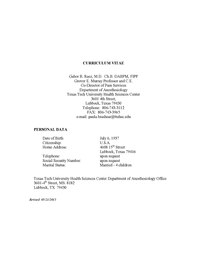
Back سيرة ذاتية Arabic سيره ذاتيه ARZ Curriculum vitae Azerbaijani CV Bulgarian জীবনবৃত্তান্ত Bengali/Bangla Curriculum vitae Catalan سیڤی CKB Curriculum vitæ Czech Curriculum vitæ Danish Lebenslauf (Bewerbung) German

In English, a curriculum vitae (English: / ... ˈviːtaɪ, -ˈwiːtaɪ, -ˈvaɪtiː/,[1][2][3][4] Latin for "course of life", often shortened to CV) is a short written summary of a person's career, qualifications, and education. This is the most common usage in British English.[2][4] In North America, the term résumé (also spelled resume) is used, referring to a short career summary.[5][6]
The term curriculum vitae and its abbreviation, CV, are also used especially in academia to refer to extensive or even complete summaries of a person's career, qualifications, and education, including publications and other information. This has caused the widespread misconception that it is incorrect to refer to short CVs as CVs in American English and that short CVs should be called résumés, but this is not supported by the usage recorded in American dictionaries.[citation needed] For example, the University of California, Davis notes that "[i]n the United States and Canada, CV and resume are sometimes used interchangeably" while describing the common distinction made in North-American academia between the use of these terms to refer to documents with different contents and lengths.[7]
In many countries, a short CV is typically the first information that a potential employer receives from a job-seeker, and CVs are typically used to screen applicants, often followed by an interview. CVs may also be requested for applicants to postsecondary programs, scholarships, grants, and bursaries. In the 2010s it became popular for applicants to provide an electronic version of their CV to employers by email, through an employment website, or published on a job-oriented social-networking service such as LinkedIn.
- ^ In English, the first part is always pronounced like when this simple English word is used alone, never as in Latin (even by people who know Latin well), but vitae is pronounced in various ways depending on how much the speaker knows about Latin. The Classical Latin pronunciation was [ˈwiː.tae̯], but even most people who learned Latin in school are unaware of the linguistically reconstructed correct pronunciation of Latin. Instead, they use the pronunciation /ˈviːtaɪ/, which is the pronunciation of Latin commonly taught in school in the past, or /ˈwiːtaɪ/, the one increasingly taught today. Most people nowadays never have any Latin in school, and many of them use the pronunciation /ˈvaɪtiː/.
- ^ a b "Curriculum Vitae | Definition of Curriculum Vitae by Merriam-Webster". merriam-webster.com. Retrieved 27 June 2016.
- ^ "American Heritage Dictionary Entry: curriculum vitae". ahdictionary.com. Retrieved 27 June 2016.
- ^ a b Definition of "curriculum vitae" by Oxford Dictionary on Lexico.com
- ^ Definition of "résumé" by Merriam-Webster
- ^ Definition of "résumé" by Oxford Dictionary on Lexico.com
- ^ Cite error: The named reference
ucdaviswas invoked but never defined (see the help page).
© MMXXIII Rich X Search. We shall prevail. All rights reserved. Rich X Search